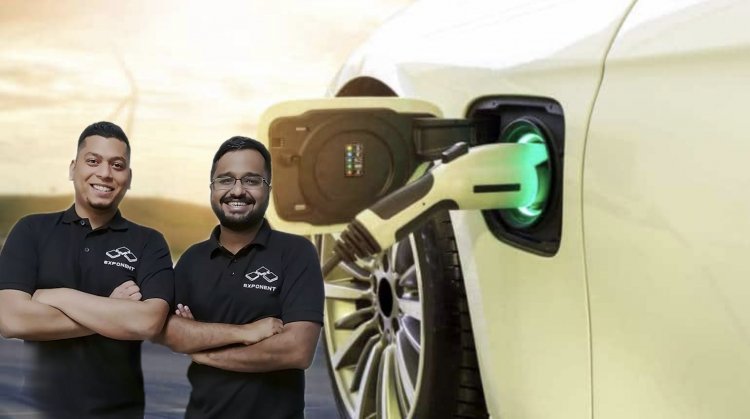“Charging your EV in 15 minutes, tripling the battery life”, an Indian Startup is rewriting the rules of the game
Prime Minister Narendra Modi’s most important project, and a flagship one at that, ‘Make in India’ is transforming India and making it a business hub for global manufacturers across a variety of sectors. Moreover, Indian startups, these days, are all charged up to contribute towards PM Modi’s project. In such a development, Indian startup Exponent […] The post “Charging your EV in 15 minutes, tripling the battery life”, an Indian Startup is rewriting the rules of the game appeared first on TFIPOST.

Prime Minister Narendra Modi’s most important project, and a flagship one at that, ‘Make in India’ is transforming India and making it a business hub for global manufacturers across a variety of sectors. Moreover, Indian startups, these days, are all charged up to contribute towards PM Modi’s project. In such a development, Indian startup Exponent Energy has manufactured a battery pack and charging station that can completely charge any commercial vehicle within fifteen minutes.
Exponent’s battery pack and charging station
A few days back, an Indian startup Exponent Energy, established by two former Ather Energy executives Arun Vinayak and Sanjay Byalal, touched a milestone. After working on a hardware innovation for the past year, the startup Exponent Energy manufactured the battery pack and charging station named E-pack & E-pump respectively that can charge any commercial vehicle within fifteen minutes. With the revolutionary manufacture of the flexible energy stack, Exponent aims to simplify energy for EVs.
Vinayak, while interacting with BusinessLine, asserted, “We now have the technologies ready and stable. It can charge a variety of cells, making us truly cell agnostic. We have charged all of these cells 800 times, each cycle being a 15 minutes charge cycle and 1-hour discharge cycle.”
He further noted, “So, it’s a far more aggressive profile than real life, because in real life you will charge in 15 minutes, but you will probably discharge over 5-6 hours. Even after 800 cycles, we’ve not lost more than 3.5 percent battery capacity. In comparison, the industry loses 20 per cent capacity in about 1,000 charging cycles,” he added. Each charging cycle is a battery charged from 0 to 100 per cent.
Given the fact that the energy consumption of logistics companies is much higher than passenger electric vehicles in India, the startup Exponent Energy is all set to target the former. To meet the target, Exponent Energy will be using affordable Lithium-ion cells for its battery pack and offer a 3,000-cycle life warranty. However, the company is aiming at collaborating with few partners to head towards the market to promote its technology.
Byalal asserted the future plan to prioritize the commercial vehicles and said, “In India, commercial vehicles today roughly represent 10 per cent of total vehicles sold in the country, yet they consume 70 per cent of on-road energy. It’s an energy-hungry segment rushing to go electric and needs a dependable rapid charging network that lets them keep going. To fulfill this demand, we intend to actively collaborate with all industry players and regulatory bodies.”
Exponent Energy to expand in India
The startup Exponent Energy, however, has a long way to go. It has its goals set for the future where it aims at investing in more cities across the nation. Exponent is all set to launch around twenty or thirty public charging stations in every city, which, as per Vinayak, is the minimum viable network required. “By January 2022, we should have 20 charging stations starting in Bengaluru and then we plan to launch in Delhi NCR,” said Vinayak.
The founder of the company firmly believes that a shift can be witnessed in the market that clearly depicts the better drive of EVs than ICE vehicles in India. However, the scale, for EVs today, is fettered owing specifically to their terrible charge times and battery life.
Vinayak noted, “A rapid charging solution agnostic of battery capacity, cell chemistry and the number of wheels on a vehicle is the first of many innovations that will unlock exponential scale for everyone.”
Transforming India with the ‘Make in India’ Initiative
It is PM Modi’s ‘Make in India’ Initiative that has helped the startups like Exponent Energy to grow efficiently. After the launch of the initiative, India had given investment commitments worth ₹16.40 lakh crore (US$230 billion) and investment inquiries worth ₹1.5 lakh crore (US$21 billion) between September 2014 to February 2016 alone. As a result, India had emerged as the top destination globally in 2015 for foreign direct investment (FDI), surpassing the United States and China, with US$60.1 billion in FDI. Additionally, in 2019, the World Bank ranked India 63rd among 190 countries in the ‘Ease of Doing Business’ index. This was a jump of 23 places from its rank of 100 in 2017.
Manufacturers from various sectors in India are leaving no stone unturned to compete on the global stage. Additionally, it can be said that the business environment is increasingly being unshackled in India, and PM Modi is personally leading a wave of reforms that will modernize and open up India’s economy.







